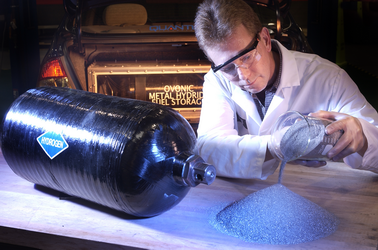Metal hydrides

A metal hydride tank (Image courtesy of ECD Ovonics)
A metal hydride cylinder, whilst technically a chemical method of storing the hydrogen, appears for all purposes to be just a hydrogen tank; hydrogen goes in and comes out unchanged. Some metals, usually alloys, have an affinity for hydrogen. The tanks are filled with finely divided grains of these alloys. The most common metals used are alloys of nickel, magnesium, iron, titanium, manganese, or chromium (or others). Different alloys offer different H2 capacities and dissociation characteristics. The metal grains essentially act as a hydrogen sponge, and need no reformers or fuel processors to supply a pure and consistent stream of H2. As seen in the table above, in terms of specific energy (amount of H2 per kilo) the technology doesn’t seem particularly beneficial. A figure of 0.58 kWhr per kg isn’t very large. However, when we consider the energy density (or H2 per unit volume) of the metal hydride, we find that it is even higher than cryogenic or high-pressure hydrogen.
The hydride tank would need to be filled at about 3 bar, which isn’t a dangerously high pressure. If the container was to leak, the temperature would fall and hinder the release of the gas further, hence it’s quite safe. The tank would only take a few minutes to fill.
The capacities of some different alloys are outlined below:
Alloy |
Moles of H stored per cm3 |
% of weight which is stored H |
MgH2 |
0.65 |
7.6 |
Mg2NiH4 |
0.59 |
3.6 |
FeTiH2 |
0.6 |
1.89 |
LaNi5H6 |
0.55 |
1.37 |
The only significant disadvantage of the technique is the mass of alloy required to store the H2; it’s quite heavy. These tanks are ideally suited for applications where space is at a premium but weight is not important. For example, in a boat some weight in the keel is an advantage to maintain stability but space is very limited. Another potential application is fuel cell powered electronics such as laptops.
In short, metal hydrides are a very promising technology.

